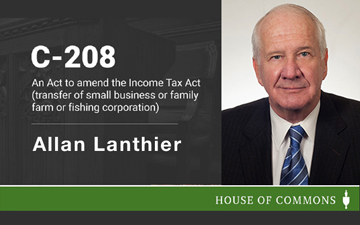Tax relief for family business transfers: A legislative fiasco – Part II

In part two of a two-part series, Allan Lanthier outlines the strategy for legislative repeal and predicts what lies ahead for Bill C-208
Montreal – An individual who sells a business to family members often faces a heavier tax burden than would have applied on a sale to an unrelated third party.
Part I of this article described the attempts to fix these rules over the last several years, and provided a detailed analysis of a private member’s bill — Bill C-208 — that received royal assent on June 29. Part II describes the government announcement that followed, and gives a prediction of what may lie ahead.
The background
In 2017, finance minister Bill Morneau announced that the government would work with family businesses, including farming and fishing businesses, to make it more tax efficient to transfer a business to the next generation. In fact, two private member’s bills had already tried to do exactly that, and accommodate transfers to children and grandchildren. The first bill was sponsored by a Liberal MP when the Liberals were in opposition in 2015, and the second by a member of the NDP caucus in 2016. Both attempts failed.
The government continued to dither, and so Conservative MP Larry Maguire took over the file and introduced the bill for the third time. This time it passed, and with bipartisan support. All opposition party members voted in favour of the bill, as did 19 Liberal MPs. Bill C-208 received royal assent on June 29 and became law on that date. But the new law was deeply flawed: Bill C-208 contains loopholes that create a new surplus stripping scheme: it also has a number of drafting errors.
The news release of June 30
What was the government to do? It had allowed a bill that was in desperate need of repair to become law but, particularly with an election on the horizon, it did not want to antagonize all of the small business and farming lobbyists across the country. Its response was political gamesmanship at its best.
The day after Bill C-208 received royal assent, the government announced that the bill did not include a coming-into-force provision, that the government is committed to facilitating intergenerational business transfers while preventing tax avoidance, and that it therefore proposes to introduce legislation to “clarify” that these amendments would apply as of January 1, 2022.[1]
There is in fact nothing to “clarify”. The Interpretation Act governs the interpretation of every federal law in Canada and states in part that an enactment that is not expressed to come into force on a particular day shall be construed as coming into force on the expiration of the day immediately before the day of royal assent.[2] Bill C-208 is therefore in full force and effect, and its provisions are now part of the Income Tax Act.[3]
Political-speak aside, what the government announcement really said is that, sometime later this year, it intends to retroactively repeal the relief that was just added to the Act with bipartisan support, and introduce new provisions that have yet to be determined, let alone drafted, to take effect next January. Until that happens, many family business transfers will not be able to proceed.
Retroactive legislation
Retroactive legislation (in this case the retroactive repeal later this year of a bill that became law on June 29) often raises issues of fairness. However, Canadian law is clear that retroactive legislation is generally acceptable and, in tax matters, commonplace.[4] That is not to say that the courts applaud retroactive legislation. In MIL Investments,[5] the Tax Court of Canada stated that:
“Retroactive legislation, although within the power of Parliament is legal but undesirable. The inappropriateness of reassessing taxpayers who completed transactions in accordance with the law in force at the time of those transactions without any expectation of adverse retroactive effect is self-evident.”
In this case however, the government announcement of June 30 did put taxpayers on notice that the law that is now in force as a result of Bill C-208 will be retroactively repealed later this year. There is therefore no element of surprise, and Parliament has every right to proceed with the announced repeal if it so decides.
What might the framework of the new rules look like?
The framework of the rules to come is fairly predictable: in fact the province of Quebec already has similar provisions that limit tax relief to genuine business transfers.[6] We should expect to see something along the following lines:
- Section 84.1 of the Act will not apply to a sale of shares of a qualified small business corporation or shares of a farming or fishing corporation, if children or grandchildren of the taxpayer who are at least 18 years of age own shares of the purchaser corporation that give them more than 50 percent of both the votes and value of the purchaser corporation, and the purchaser corporation owns shares of the subject corporation (the family business corporation) that give the purchaser corporation substantially all of the votes and value of the subject corporation.[7]
- These ownership restrictions must be met at the time of the sale and continuously for a prescribed period of time thereafter – for example, for a period of 36 months.[8] If the restrictions are breached during this period, a deemed dividend would arise on the initial sale.
- However, a disposition of shares of the purchaser corporation on the death of a child or grandchild should not result in a denial of the new relief.
- In addition, the new relief will only apply if the purchaser corporation continues to own the shares of the subject corporation for the prescribed period of time, and the subject corporation continues to carry on the family business for that same period.
- The parent or parents must reduce or eliminate their involvement in the operation and management of the business, and the children or grandchildren must assume that role.[9]
- To provide some certainty, a bright-line test should deem the children or grandchildren to be operating and managing the business if they work in the business for a prescribed period of time: for example, an average of at least 20 hours per week for at least 40 weeks in any calendar year.[10]
- The relief should be restricted to smaller corporations. The new rules should therefore not be available on the sale of shares of a subject corporation that, alone or together with associated corporations, had taxable capital of more than $15 million at the end of the taxation year immediately preceding the date of sale.
- Additional rules in Bill C-208 that require the taxpayer to provide the Minister with an independent assessment of the fair market value of the transferred shares, as well as an affidavit signed by the taxpayer and by a third party attesting to the disposal of the shares, are not required and should also be repealed.
- Finally, the extended reassessment period under paragraph 152(4)(b) of the Act should apply to reassessments made as a consequence of the sale of family business shares.
Conclusion
This long saga should reach a happy ending by the end of this year, but the government should have never allowed the process to unfold as it did. Announcing that a law will be repealed the day after it is enacted by Parliament is no way to run a railroad, let alone a country. Canadians — including small business owners — deserved better.
Allan Lanthier is a retired partner of an international accounting firm, and has been an advisor to both the Department of Finance and the Canada Revenue Agency.
Read part one of this two-part series: Tax relief for family business transfers: A legislative fiasco – Part I.
Footnotes
[1] News Release dated June 30, 2021 from the Department of Finance.
[2] Paragraph 6(2)(a) of the Interpretation Act.
[3] The Canadian federal Income Tax Act, referred to herein as the “Act”.
[4] See Catherine Brown and Arthur J. Cockfield; “Rectification of Tax Mistakes Versus Retroactive Tax Laws: Reconciling Competing Visions of the Rule of Law”; 2013 Canadian Tax Journal; Canadian Tax Foundation.
[5] MIL (Investments) S.A. v. The Queen: [2006] 5 CTC 2552.
[6] Sections 517.5.3 to 517.5.11 of the Quebec Taxation Act. However, the Quebec provincial restrictions are much too detailed and complex: they may therefore give direction, but should not serve as a model for new federal law.
[7] This amendment would not apply on the sale of shares of a subject corporation, by the estate of a deceased individual, to a purchaser corporation controlled by the beneficiaries of the estate. However, the traditional planning for so-called “post-mortem pipelines” (planning which is beyond the scope of this article) should continue to apply.
[8] While Bill C-208 has an ownership test based on 60 months, this period of time may be too lengthy in the context of law that has more robust safeguards. A lot can happen in 60 months, and it seems odd to only finally determine the tax consequences of a transaction five years after the transaction has taken place. It is therefore hoped that Finance will settle on a shorter period of time.
[9] Under the Act, business activities can generally be carried on through a third-party agent: see for example the decision of the Federal Court – Trial Division in Canada Trustco Mortgage Company ([1999] 2 CTC 308). Such a rule should therefore require that the children or grandchildren themselves be actively involved in the business.
[10] This type of bright-line test is used in paragraph 120.4(1.1)(a) of the Act, as part of the TOSI provisions.











(0) Comments